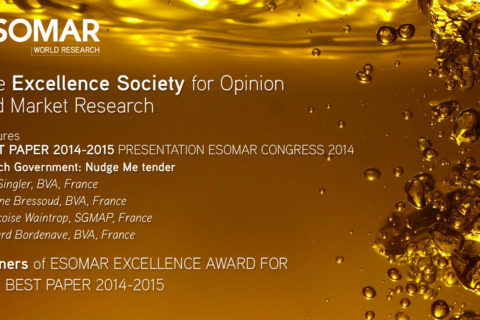By Martina Olbertová
I would like to reach out to you with a topic that concerns the broad community of marketing, strategy and market research professionals worldwide. It’s because it concerns the very bottom line of any business – its value creation and how marketing can promote value via capitalizing on its inner meaning.
Proper understanding of our everyday context largely impacts what we create in this world. It’s because who really understands the context of things happening today, better understands the world tomorrow. Context is key to predicting the future: the future of brands, marketing, businesses, and our own lives. And the marketing industry should very much reflect that.
So What is Really Happening?
The world is changing rapidly. Technology is changing the scope of human capacity faster than ever before. Our hunger for data and information seems to be unstoppable often leaving us confused, overwhelmed and cluttered.
The problem with clutter is that it displaces meaning. It gives us a clear message that quantity is more important than quality. Moreover, it fragments our perception, emotional responses and memory structures. This creates a non-stop state of cognitive dissonance, which paralyzes our ability to think clearly and make sense of the world around us. Constantly preoccupied, we are probably wondering: What do all these things mean? On a daily basis.
Meanwhile, Businesses are Also Changing
The obsession with technology has accelerated the rate at which businesses need to innovate to stay ahead of their competitors. But here’s the tricky thing: When all businesses are chasing after fads in order to stay relevant in the now, who makes sure that they’re running in the right direction? Who makes sure that the decisions being made now are the right kind of decisions to benefit businesses in the future?
The Problem with Data-Based Predictions is That They Can Easily Bury Your Future in the Past
It’s not necessarily that we have the wrong data; but that we are using the data incorrectly. We’re interpreting their meaning outside of our own natural context: culture, human evolution, our needs, desires and most importantly – the human yearning for meaning.
Meaning is the underlying value of all human creation, therefore also business creation. Businesses need to have meaning to have a business value. They are not machines, as the early modernity mindset made us believe, they’re more like ecosystems – living organisms, whose growth is organic. They need to adapt to change in order to evolve in the future. This is why businesses need to start embracing meaning, not data, to stay relevant to customers.
We are Entering the New Age of Meaning
This age will be driven not by data, but meaning. We are drowning in data, but are suffering from an utter scarcity of meaning. Meaning has been deflated in our lives – the majority of things that surround us don’t mean anything anymore: news, media, commercials, art, our possessions, or even relationships. We already have all we need. All we need is less. And for that, we need to come back to sense.
This is the most significant paradigm shift since the post-WWII concept of mass consumption and it’s about to rewrite the rules of business on a global scale. It’s emerging as a direct response to the boom of digital technology and excess of products and information on one hand, and the explosion of choices and redistribution of value creation and value exchange on the other. Every major change in our history so far has been instigated by the innovation of technology. This time the change is human-centric.
We are transitioning from the old world of ‘ownership’ objectifying people as consumers and customers, towards the disperse and fluid world of ‘users’ actively pursuing value based on utility. We already see the manifestations emerging in the market – e.g. peer-to-peer models or the rise of the Sharing Economy shifting the underlying logic of value creation. As it turns out, there’s only so much we need to own to be able to enable usage. And if conspicuous consumption has taught us a lesson, it surely was that “When you consume a lot of stuff, the stuff ends up consuming you.”
Brands Transition in the Meaning Economy
Consumption has become one of our primary social vehicles for self-actualization; an instrument we use to enhance our own individual identities based on how we feel, what we stand for and what message we want to send out to the world. Consumers already report that consumption is “less about the products and more about them and how they feel”. It’s because people don’t actually consume products for products, but for the symbolic value they represent.
What brand managers worldwide will soon need to realize is that they’re not selling products and services anymore, but their symbols and meanings. This is why brands of future will need to be managed based on their inner meaning – the symbolic value of a brand. Meaning is the single one most important asset of a brand in the marketplace and the core of brand equity.
To stay relevant in the world to come, brands will have to provide their customers with relevant meanings they can identify with on a deeper emotional level and in the context of their own everyday lives. Brands will need to understand not only who their customers are and what makes them tick but WHY. Asking the WHY brings meaning to the center of the brand universe. This will make brand strategies replicable and future-proof: meaning is the recipe for brand’s future success.
So How Can We Make Brands Meaningful Again?
First of all, we need to stop acting insane. As Albert Einstein once said: “Doing the same thing over and over again and expecting different results is the definition of insanity.” No amount of the same data will ever help us conceive anything new.
Instead, we need to start asking the right questions to the answers we already have. These are questions such as: “What does our brand actually mean?” (brand meaning), “What does it mean to our customers?” (brand relevance), “Does it resonate with people on a deeper cultural level?” (brand resonance), and most importantly: “What does brand stand for and how can it promote its value in context of real people’s lives?” (brand purpose – the North Star of your company).
To make a real difference and move the marketing industry forward in a more meaningful direction, we have to address these 3 core areas:
1. Move from Market Research to Meaning Extraction:
Market Research heavily relies on data reporting as its everyday nature, but we need to go behind the data to extract its real business value. We need to shift our perspective from being data-centric to a meaning-centric approach to research. For this, we will need to look at data in a broader context to better understand the real implications on business value creation in the future. Looking at meaning patterns and explaining their business value will also increase relevance of market research as an industry.
2. Move from Brand Management to Brand Leadership:
Management is about effectively coping with complexity. Leadership is about setting a clear direction. We need to do more of the latter. We need to stop looking at brands as systems of channels to operate, and instead focus on the underlying meaning. This will help us set a clear future direction that is intact with brand’s inner essence. Looking at brands as systems of interlocked meanings to be managed symbolically, as well as logistically, will make brand execution more coherent and less fragmented. It will also positively impact brand relevance and resonance with customers and their cultures.
3. Integrate Brand Leadership with Business Leadership:
Brand strategy today largely functions only as a transfer of insights to creative, but its role is much bigger. Brand is one of the primary strategic assets of any company. It’s not a nice to have, it’s a must have – brand is a strategic decision that needs to be informed by the company’s future business direction. Brand belongs in the boardroom, not in the marketing department. We need to move brand decision-making to the management level to make sure the brand runs in sync with business strategy.
Embracing these changes and moving brand decisions on the right level can make the marketing industry a more meaningful place again. If we all start doing little steps in the right direction every day – create less noise, less clutter, communicate more clearly and efficiently, then it will have a big impact for all of us. Environment has a profound impact on the quality of our lives and to a large extend determines what kind of a person we are – content and happy, or nervous and preoccupied.
And once corporations realize that meaning is not only the best strategy, but also the most profitable, I’m sure they will follow soon.
Martina Olbertová is a Global Brand Strategy Consultant and Commercial Semiotician based in Europe. She can be reached via Twitter @MartinaOlb



3 comments
I agree with what you said. I think that time is passing by so fast and the world is changing too, as well as technology and so is business. I think that business owner must really have to know how to adapt in order to grow and achieve a successful business. Thanks for sharing this article.
An organization\’s strategy combines all of its marketing goals into one comprehensive plan. A good marketing strategy should be drawn from market research and focus on the right product mix in order to achieve the maximum profit potential and sustain the business. I would recommend you to kindly visit this website http://smstudy.com/Certification/Marketing-Strategy this is amazing website. I have even taken few of free certificates which I found very productive and impressive for my marketing skills and analytics.
Interesting. Caution: trying to reveal ‘customer meaning’ through laddering (asking the ‘why’ of customers’ behavior) may prime customer goals, even values, which are actually not salient in the consumption or experience process (e.g. self-fulfillment or self-expression) . A more grounded and actionable focus of researchers could be to reveal ‘customer sense’ by asking the ‘what’ question: “what do you think this brand or service organization tries to communicate to and achieve with you?” When customers make positive relational sense out of marketers’ seduction efforts marketer’s have a green light to jive…